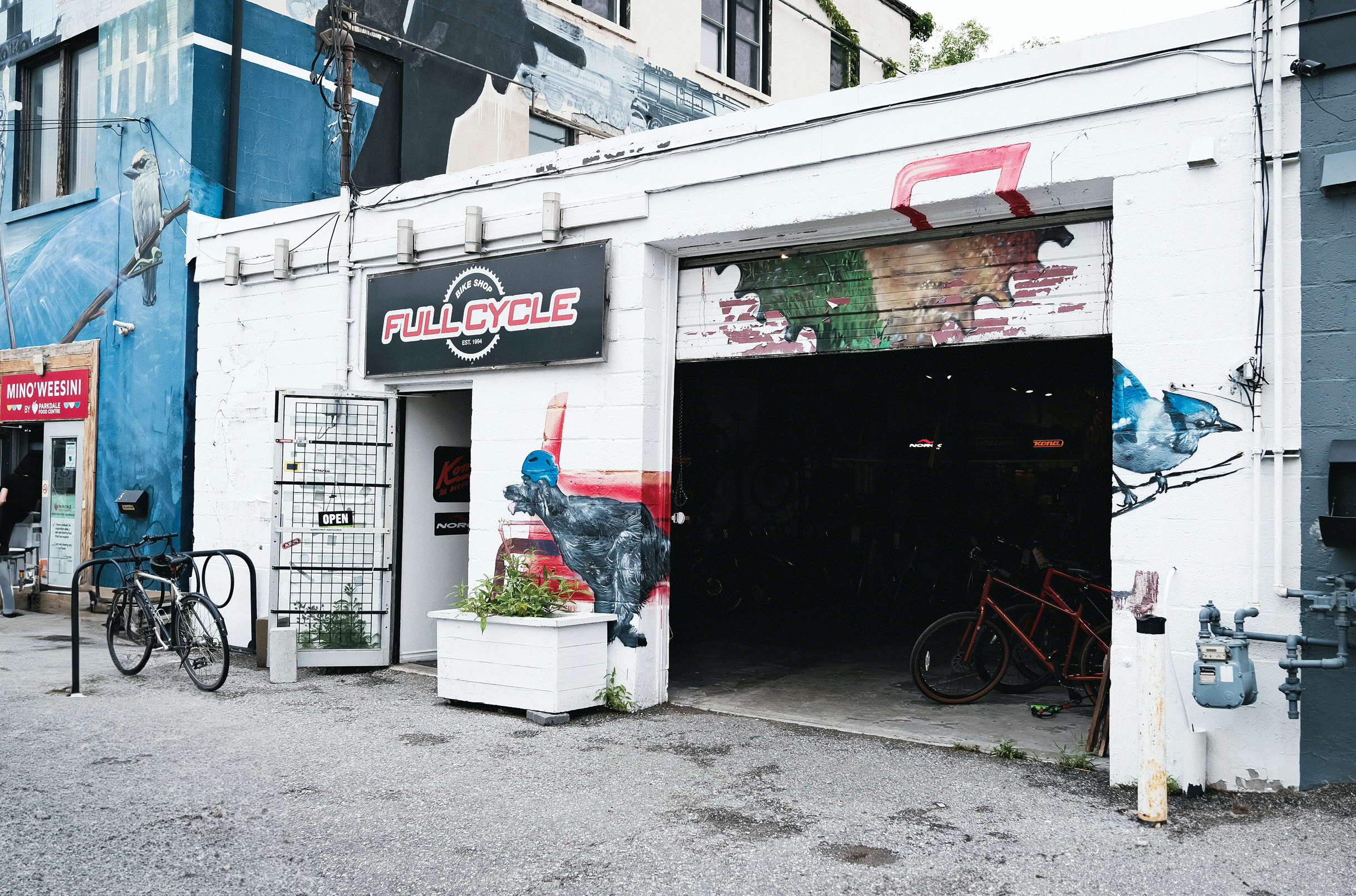Top Bike Shops from Across Canada
These places don’t just peddle bikes, they make passionate cyclists
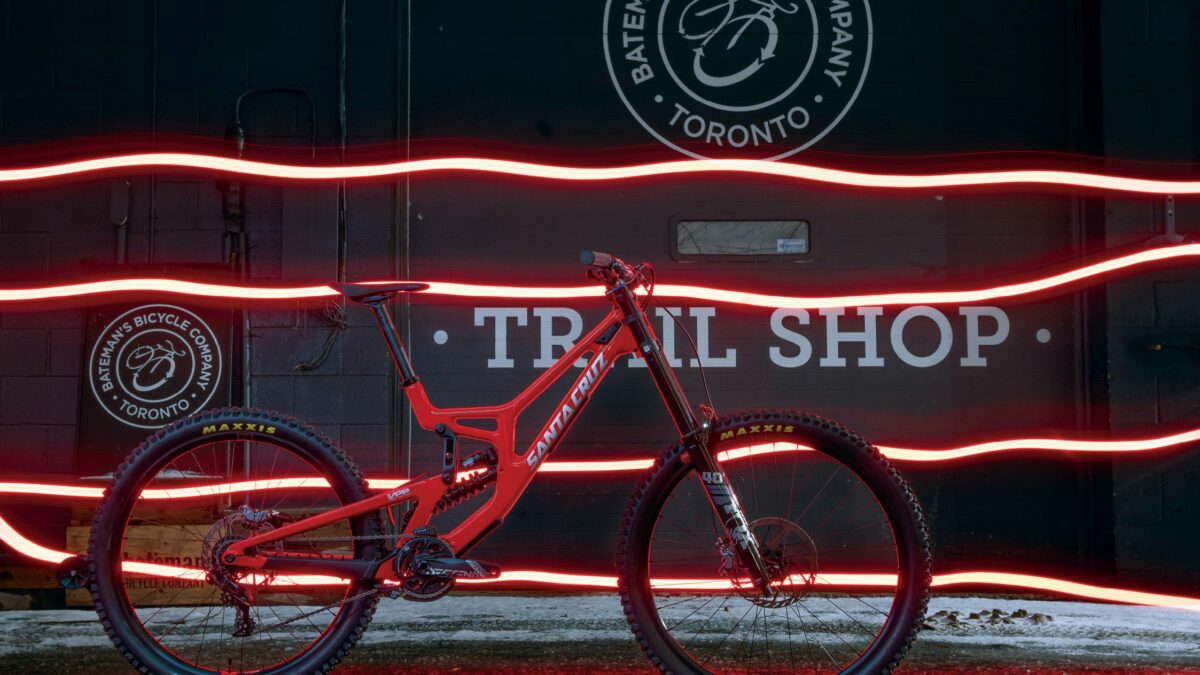 Photo by:
Jeremy Worden
Photo by:
Jeremy Worden
What makes a bike shop special? For some, it’s the patina of decades of grease worn into corners, scrubbed clean and worn in again. For others, it’s the social scene of group rides and après. Some places may prioritize a bit of street cred, while others go to exceptional lengths to make sure no rider’s weekend is ruined for want of some small part. Also, don’t forget craftsmanship, knowledgeable staff and that special feeling that only bikes can bring—a mix of open-road adventure, slipping off responsibilities and being a kid again (even if the ice cream is more artisanal now).
The best shops have some mix of all of those elements, bundled up into a sense of community. The best shops are founded on passion and a strong desire to share that passion.
Long Alley Bicycles
Halifax
The path Paul Rogers took to opening Long Alley Bicycles wasn’t exactly straightforward. A music and theatre graduate working in that industry, he pivoted to take ownership of a restaurant for a while before selling the business and cycling across Canada. When he arrived at the West Coast, Rogers was so enamoured with bikes that he took a job in a shop for about a year before returning to Halifax and working in a local bike store.
Rogers noticed that, over time, all of the bike shops on Quinpool Road moved elsewhere, leaving a gap. Rogers found a back alley space and opened up Long Alley Bicycles, initially focusing on used bikes. Later, he brought on staff and started selling new bikes. The shop grew into the current location with a storefront on Quinpool.
“Being community-focused as a shop, we draw in people who are already pretty awesome,” says Rogers about how he finds new staff. “Experience is a bonus, but attitude is more important. Everyone is really happy to share their enthusiasm for bikes, so we’ve never needed to say, ‘This is how we greet customers.’”
Whether someone is just getting started in cycling or has been at it for decades, Long Alley is a welcoming place full of people ready to help you reach whatever bike dreams you may have.
That interest can start early for some. Long Alley has been working with a local high school to provide opportunities in co-op programs for students who have an interest in bikes. Teens come to Long Alley to gain experience they can use to continue in the bike industry.
The staff are also free to create opportunities in the region that fit their preferred type of cycling, whether that’s helping maintain mountain bike trails, creating a cyclocross race, reviving old road events, or developing a Tip 2 Tip ride in Nova Scotia, a 750-km route for those keen on endurance cycling.
Best For all your Nova Scotia cycling ambitions, big and small—whether you want a bike to ride to the local park or something to ride from the province’s southwest corner all the way up to Cape Breton.
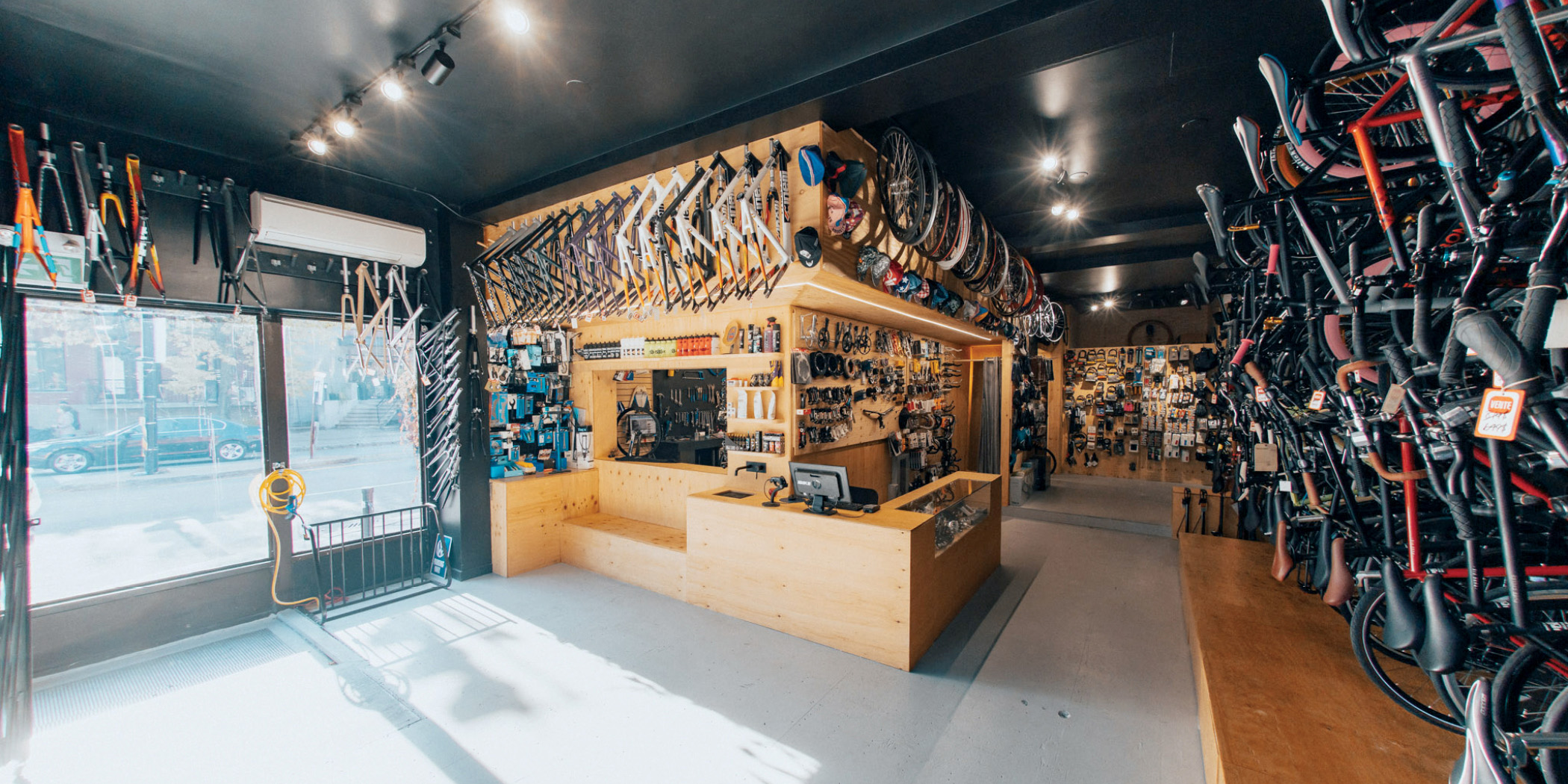 photo: refinedmoment
photo: refinedmoment
Velo iBike
Montreal
Located on the Island of Montreal, Velo iBike opened its doors in 2010. For Josh Gieni it was a big career shift. He’d been a teacher, and then a principal in Saskatchewan before moving to Montreal and opening the shop. While the retail world is different from education, Gieni realized there was a fair bit of common ground.
When the shop opened, there was little winter cycling in the city. Further complicating things is Montreal’s unique municipal structure with 14 districts and 14 mayors. The result is a patchwork of infrastructure.
“We put our focus into educating people on winter riding,” Gieni says. “We made a bunch of instructional videos and regularly include info in our social media.”
As word has spread and infrastructure improved, more riders have taken to the streets year-round. Major cycling routes now get plowed free of snow. Even the city’s bike share program, Bixi, leaves some of its stations and fleet out for the winter, fitting the bikes with studded tires.
“You might think Bixi would be our competitor, but it’s not. People try it a few times and decide they like it enough to come and buy a bike from us,” Gieni says. “We’ve seen it—if the city invests in infrastructure, people use it.”
Part of the education efforts from the shop extend to its race team. Focused on track, road and cyclocross, the team, which numbers approximately 60 riders, competes at the elite masters level.
All of this experience has given the shop a lot of credibility. Its staff has the trust of its community and knows it can influence the city for the better. “What am I most proud of? We’re at the point where our voice is bigger than just the shop,” Gieni says. “We’re respected. If we have an idea for the community, we’re heard.”
Best For shaping year-round riding. Velo iBike has been a pioneer in promoting winter cycling in Montreal.
Full Cycle
Ottawa
Established in 1994, Full Cycle has grown to include a second location in Ottawa, as well as a seasonal shop at nearby Camp Fortune in Chelsea, Que. Rooted in an ethos of strong customer service, the shop is a big supporter of cycling in the community.
“Sure, we could just sell and fix bikes, but if we’re not doing the community work, why are we even here?” asks owner Matti Pihlainen. “Shops aren’t just about selling stuff because customers could just go buy online. Being part of the community is vital.”
Five years ago, the shop had to say no to a lot of events because it simply didn’t have the resources in place to do more. “We realized that there was a lot of opportunity, so we hired staff specifically to work on community events and engagement,” Pihlainen says.
The result is a calendar full of events almost year-round. One week this past February, for example, Full Cycle was collaborating with a spin studio for a special event and supporting two separate fat bike events.
Support for riders even happens after-hours. There’s a vending machine outside the St. Laurent shop, and another at nearby Mont Ste.-Marie during the riding season. The machines allow cyclists to buy essentials that can rescue a ride—a spare chain or tube, or a multi-tool to replace one that’s been lost. The warehouse stocks a dizzying array of small parts, too.
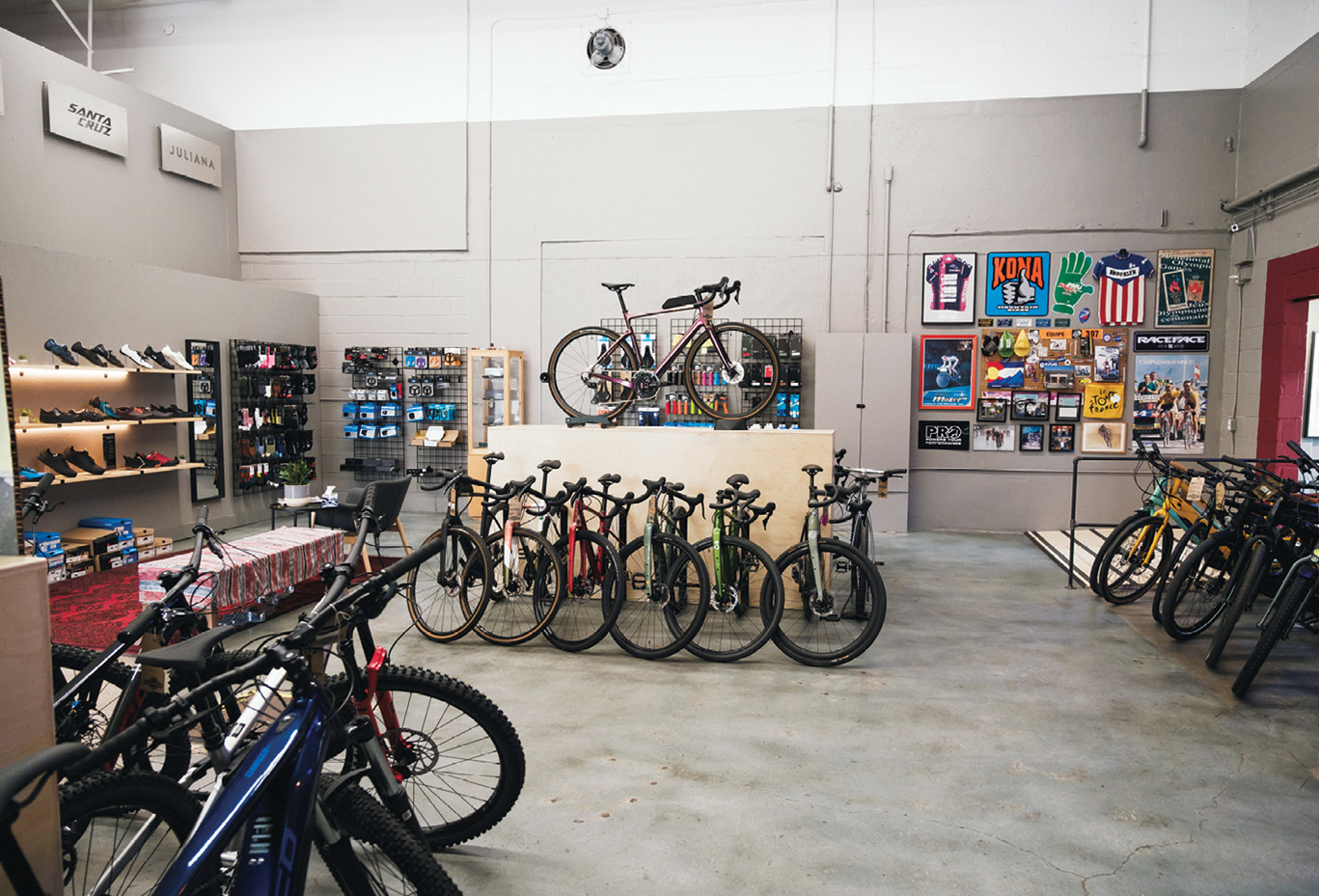 Full Cycle
Full Cycle
“It might seem foolish to stock those $5 or $10 bolts, but we know how having those on hand can save a customer’s weekend plans,” Pihlainen says. “I’d rather we stocked that stuff and saved someone’s day than tell them, ‘Yeah, we can order that for you.’”
But like all good shops, it’s the staff who make Full Cycle what it is. In a busy bike market like Ottawa’s, good staff can be hard to keep. “We knew we wanted our staff to be happy because that makes a difference in the quality and care they put into their work,” Pihlainen says. The shop is a certified living-wage employer; all the full-time employees have full health and dental benefits. “Other shops complain about staff turnover, and we just don’t have that problem. We commit to them, and they commit to us.”
Best For community involvement. Having dedicated staff for community events helps the shop support the Ottawa cycling community in a big way.
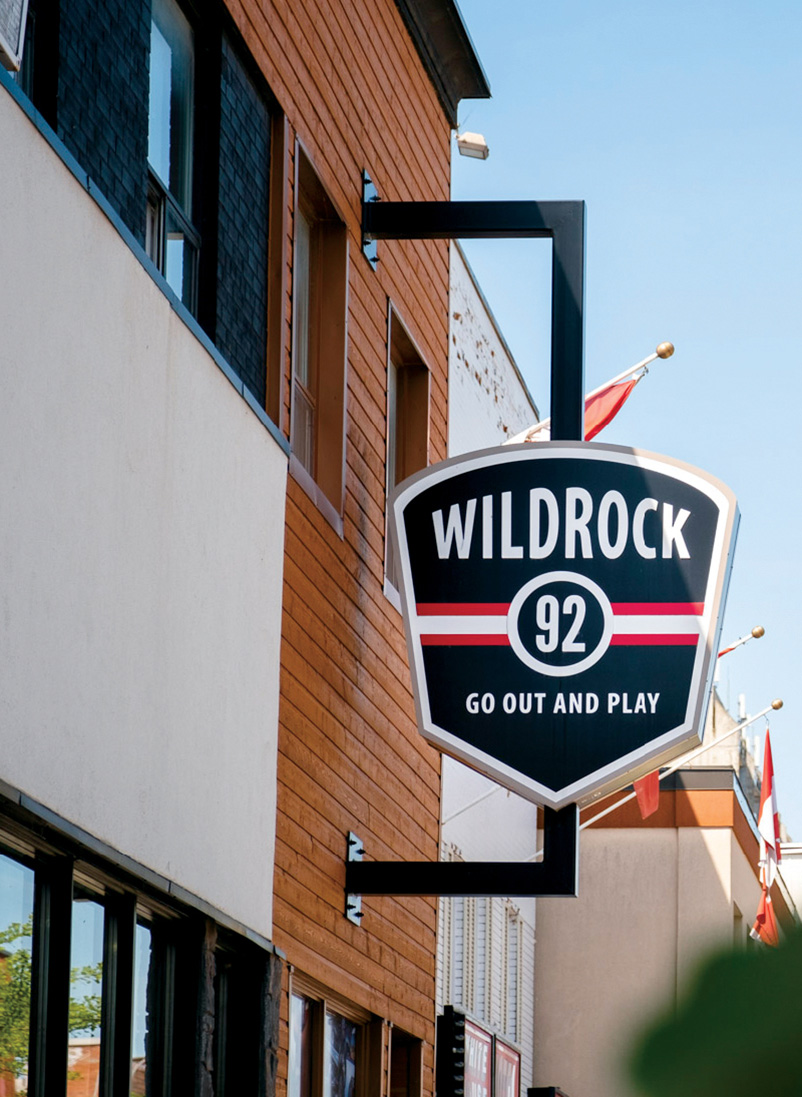 photos: Justin Ross
photos: Justin Ross
Wild Rock Outfitters
Peterborough, Ont.
Kieran Andrews grew up in Ottawa, riding and racing bikes in the Gatineau Hills across the river in Quebec. By the early 1990s, he was ready for a change. He moved to Peterborough—about 270 km southwest—and opened Wild Rock Outfitters in 1992 with Scott Murison. At the time, the store focused on outdoor gear. By 2000, Andrews added bikes into the mix. He also started up the Peterborough Cycling Club. From the get-go, he made sure to build something different than what he had grown up with in Ottawa.
“There was a lot of infighting and rivalry at the time in the Ottawa bike scene, and I didn’t want that to happen in Peterborough,” Andrews says. Rather than focusing on one kind of riding, the club became a home for anyone who wanted to have fun on two wheels, from kids’ programs right up to ice-cream rides for seniors.
“The move to Peterborough was strategic, and so was the club,” Andrews says. “I wanted to set the tone for cycling in a city, and you needed the right size of city for that.”
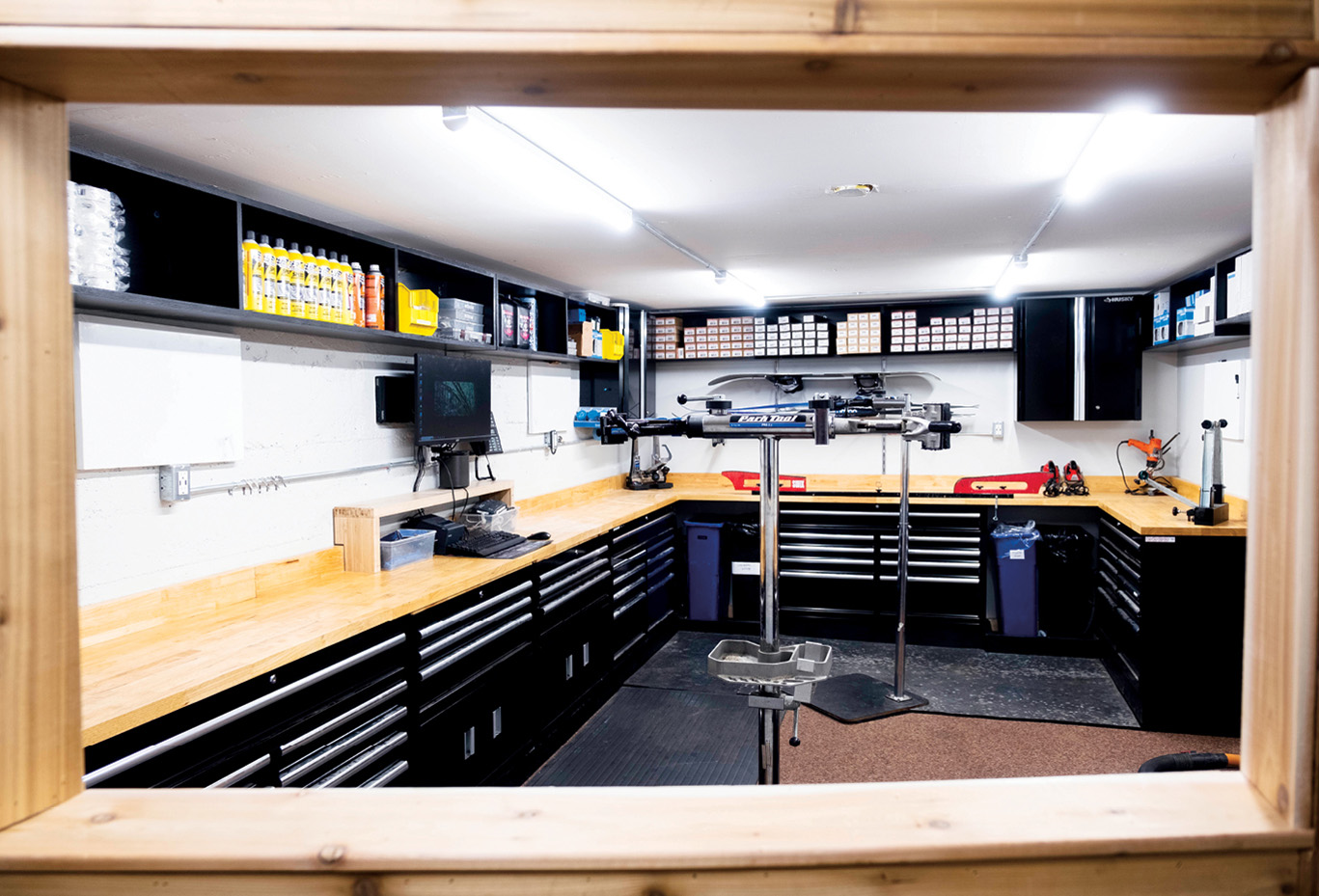 Wild Rock Outfitters
Wild Rock Outfitters
Andrews has had that influence, helping to shape cycling infrastructure and programming in the city for the past two decades. The shop was at the forefront of gravel riding, largely because of the multitude of gravel roads stretching out from the city in all directions. When Shimano was getting ready to launch the GRX line, Andrews was tapped to be an early ambassador in part because he was already riding gravel, and probably thanks to having his shop in the same town as Shimano Canada’s HQ.
Andrews is shifting his focus now from shop life to other projects, including the ComPassion project, a philanthropic effort that aims to address a number of issues affecting the community. Working with local organizations that combat homelessness and food insecurity in the region, the ComPassion project amplifies the work of local NGOs through the Wild Rock mailing list to drive greater support to places it is most needed.
“We feel like we’re at the heart of a community, which comes with a lot of responsibility,” Andrews says. “We need to do it well.”
Best For getting kitted out for bikepacking. Wild Rock has decades of expertise both in bikes and camping. It’s the bikepacker’s one-stop shop.
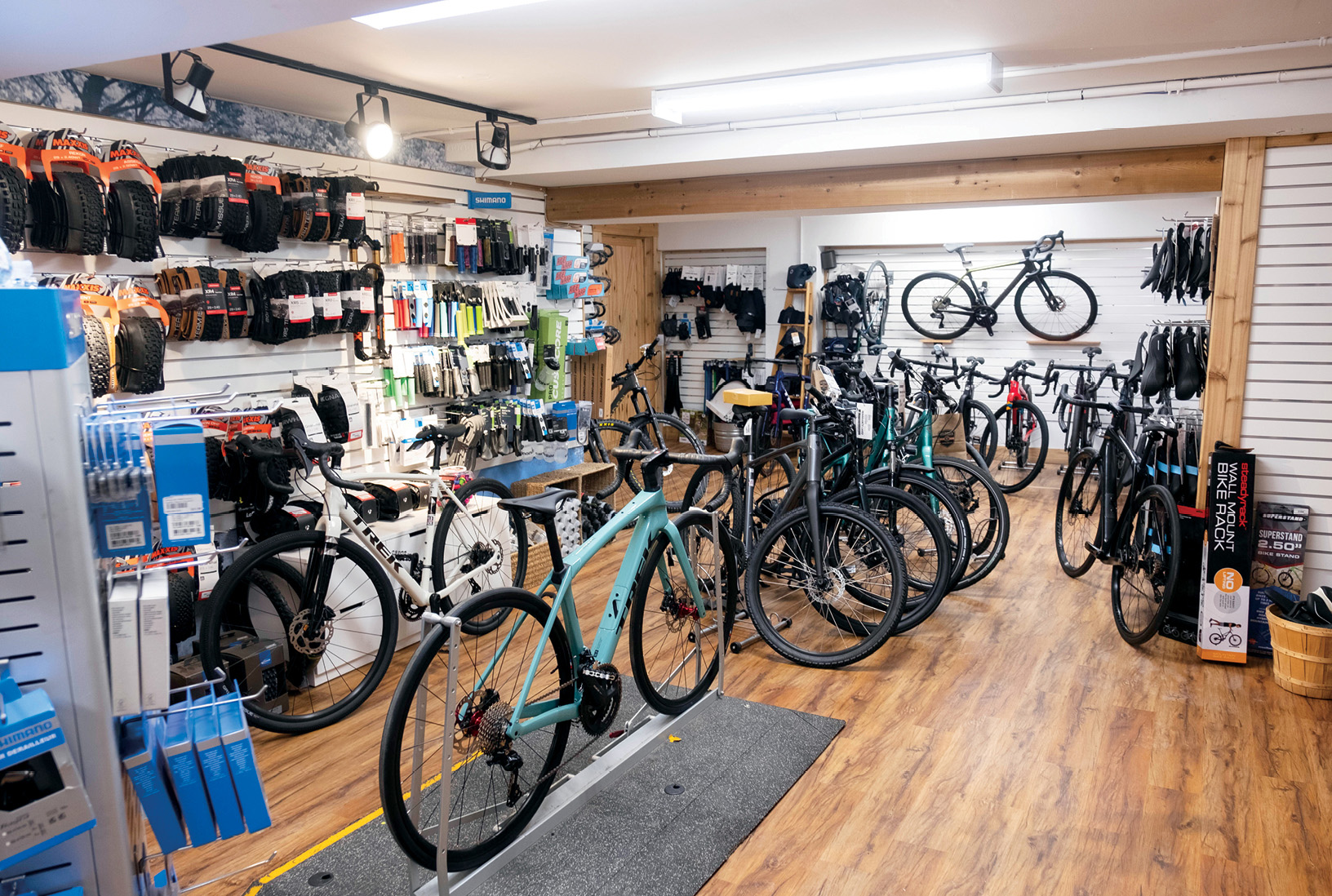 Wild Rock Outfitters
Wild Rock Outfitters
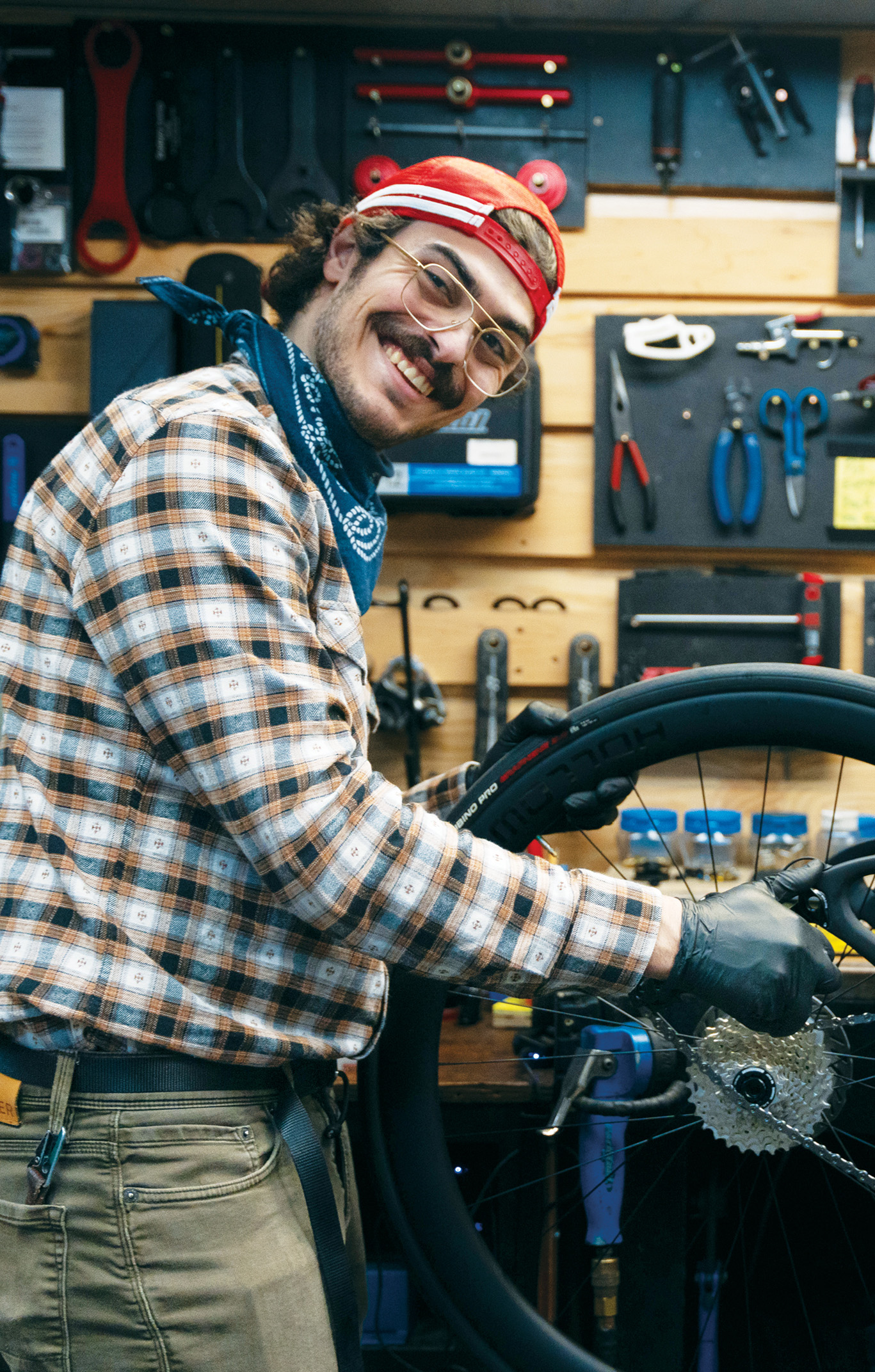 photo: Jeremy Worden
photo: Jeremy Worden
Bateman’s Bike Co.
Toronto
“When we opened in 2008, we were just a little repair shop on Barton Avenue,” says Robert Bateman, founder of the shop bearing his name. Initially, it was a one-man operation. Bateman focused efforts on the commuter scene. As things grew, he began selling new bikes, and gained a reputation as a quality shop.
In 2012, he took on a bigger location on Bathurst Street, a major route in the city. Now, there are two locations. The Trail shop is located in Leaside, near the mountain bike trails of the Don Valley. The City and Road shop is on Bathurst, not far from the original location.
Family has become a key facet of the shop. Bateman met his now-wife as a customer 15 years ago. The two now have a young family. Bateman is busy developing kids’ riding programs into his summer plans to help more youngsters grow up enjoying bikes.
While helping people get the right bike is a big part of the business, the community around the shop is a huge motivator. Wednesday night rides end back at the Trail shop for pizza and drinks, and the kids’ rides are growing quickly.
Bateman has also been behind the drive to create an Ontario Enduro race series. The 2024 calendar is coming together. There will be nine races with the best five counting toward the overall results.
Looking ahead, Bateman is excited about the creation of the Don Grom Training Camp, a summer development program for kids to help riders learn skills on the dirt in the Don Valley.
“I started this alone, but I wouldn’t be here without so many people—our loyal customers, our dedicated staff, and of course the support of my wife,” Bateman says. “As far as the shop goes, we don’t need to get bigger, just better.”
Best For getting people into the Don Valley’s trails with programs for riders of all ages and the Trail shop on the doorstep of the best singletrack in Hogtown.
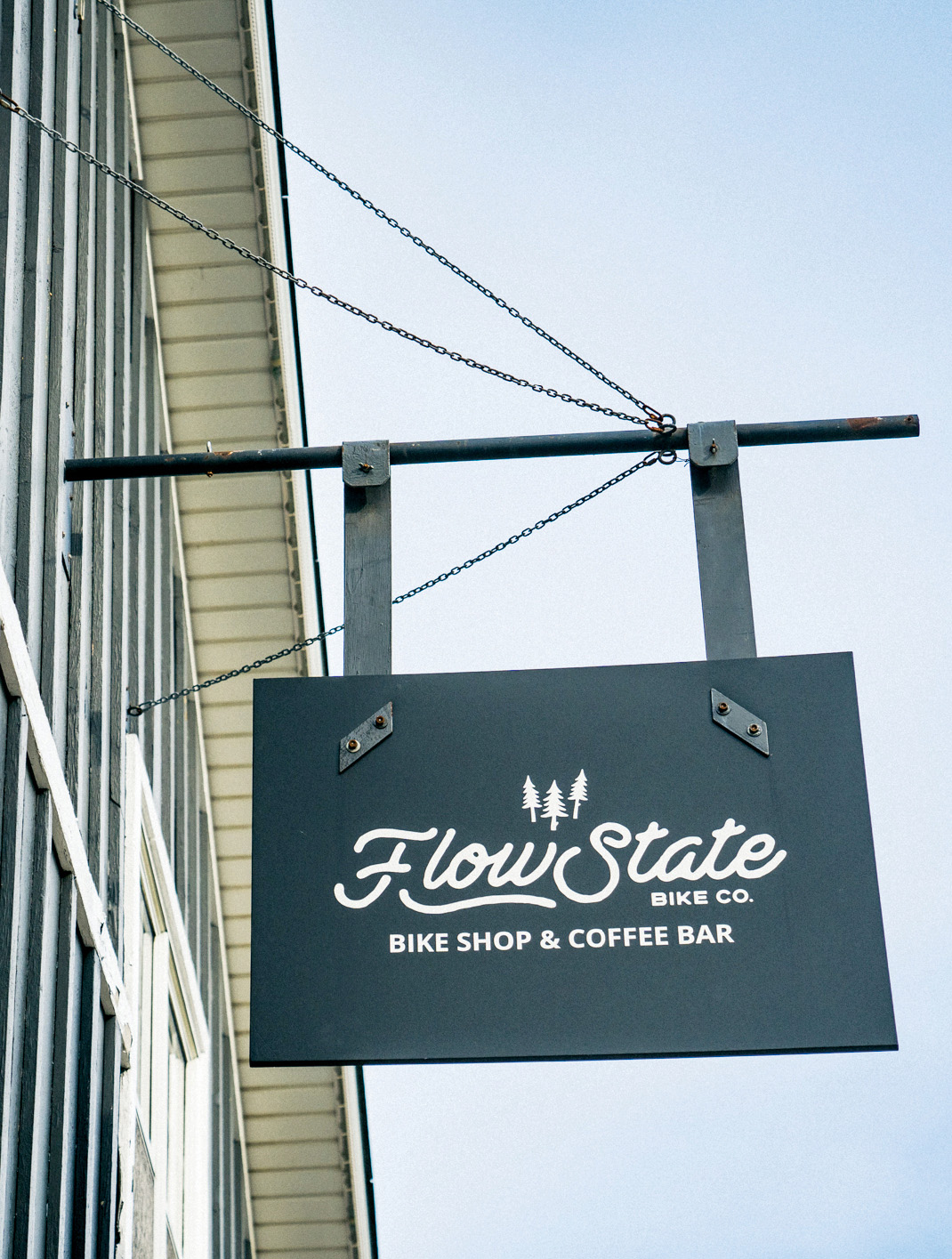 photos: Paul F Laberge
photos: Paul F Laberge
Flow State Bike Co.
Guelph, Ont.
Flow State has been around for a little more than a year, but owner Nate Lessnick has always loved bikes. He can remember saving up for an entire summer to buy his first mountain bike—100 mm of travel, 26″ wheels—the stuff dreams were made of. He took the bus to the shop, excited to ride his new bike home, keen to share his excitement with anyone who would listen.
He got into the store, spotted his bike, proudly went to pay for it, and—“That was it. No killer conversation, no high fives,” Lessnick says. “It was supposed to be this big momentous event. Instead, it felt like a big letdown.”
Because of Lessnick’s bummer of a bike-buying experience, he makes sure that doesn’t happen at Flow State. When you buy a bike at his shop, whether it’s your first or your 50th, there’s a bit of a celebration. There’s ice cream, beer, wine and coffee all on hand. Your photo gets taken with a Polaroid. The snapshot is then tacked to one of the exposed beams or pillars in the shop. It’s the kind of celebration Lessnick dreamed of when he got his first mountain bike.
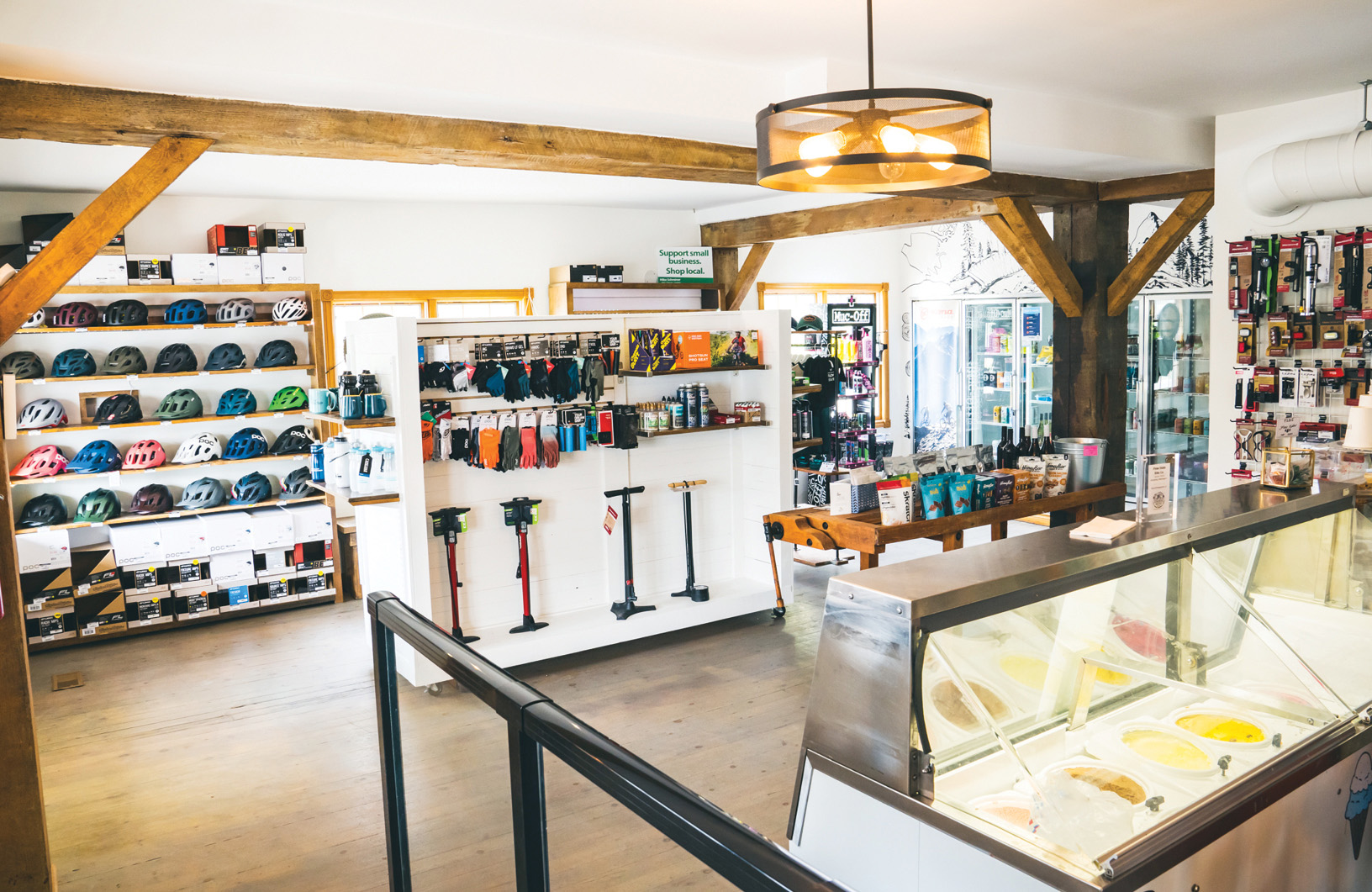 Flow State Bike Co.
Flow State Bike Co.
The feel of Flow State draws from some of the shops Lessnick has experienced in other countries. He used to work as a guide for Sacred Rides mountain bike tours, leading clients on dream trips in spectacular locations. One shop in particular stands out to him. “I was in Queenstown, New Zealand, in about 2013,” he says. “Everyone was super friendly, they had good music on, and good merch.”
Back in Ontario, Lessnick saw an opportunity to create that kind of environment. Having ice cream on the menu is essential. Between the food, drink and a location that is ideal for riders looking to escape the Greater Toronto Area on road or gravel, the shop is quickly becoming a destination. Mountain bikers also have a lot to enjoy with a handful of trail networks within a 30-minute drive.
“Buying a bike can be a big decision for a lot of people, whether it’s an entry-level bike, or something more exotic. I think bike shops have a responsibility to celebrate that purchase,” Lessnick says. “A bike is a powerful tool for positivity. If more people ride, the world can be a better place.”
Best For celebrating a new bike. Each new bike purchase comes with your choice of drink or ice cream. A Polaroid of the proud new owner is pinned up in the shop.
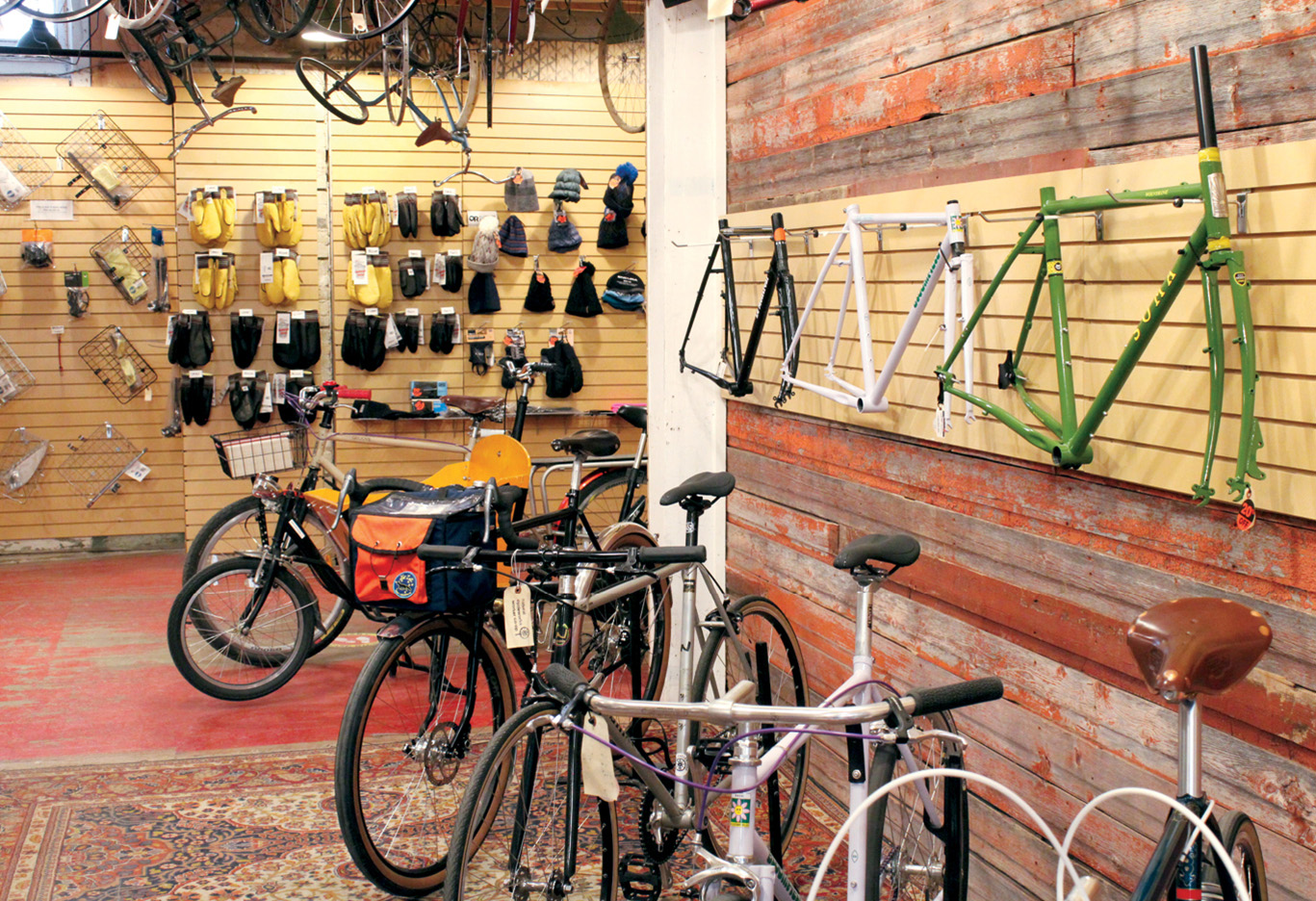
Natural Cycleworks
Winnipeg
If you’ve been around cycling long enough, you know about the bike courier scene. Before the food-delivery services of the gig economy, bike couriers were a key part of urban commerce. A blend of punk rock and the peloton, denim and Lycra, bike couriers also deeply embodied counterculture on two wheels before growing up, cleaning up and getting the Hollywood treatment in Premium Rush.
From this scene, we got alleycat races—usually point to point on open roads, mixing in traffic—and shops that catered to this different type of cyclist.
Natural Cycleworks is one of those shops. The business started as a basic repair shop and bike-courier company. Eventually it moved from repairs to selling used parts. When volunteer community bike shops started opening in Winnipeg, Natural Cycleworks switched to selling new parts, and donated its used parts to the community shops.
At the same time, the online world was wiping out the need for bike couriers. Documents could be signed digitally, and capitalist titans flooded city streets with vans delivering every package you could imagine. Natural Cycleworks shifted gears and focused on commuters and custom builds, but the shop still keeps a keen focus on community.
“We sell branded merch as a fundraiser for local charities. We build and donate a bunch of kids’ bikes and good used parts to The Wrench, a community bike shop in the city,” says Matty Adair, one of the members at Natural Cycleworks.
Unlike most shops in Canada, Natural is a co-operative. Each member of the staff joins as an apprentice for a year. If at the end of that time, they want to join as a member, they buy in, effectively becoming an owner in the process. Those who are interested but may not have the the necessary capital can still join and make up the membership fee over time. While that might seem like a lot of people sharing decisions, the draw of Natural Cycleworks pulls in like minds that work well together.
And for the fans of bike-courier culture, fear not. Between the popularity of cargo bikes, and the need to decarbonize our cities, bike couriers may become the future.
Best For bike courier culture and a co-op atmosphere. Natural Cycleworks keeps close to its roots with alleycat races and a co-op business model, both rarities in the industry.
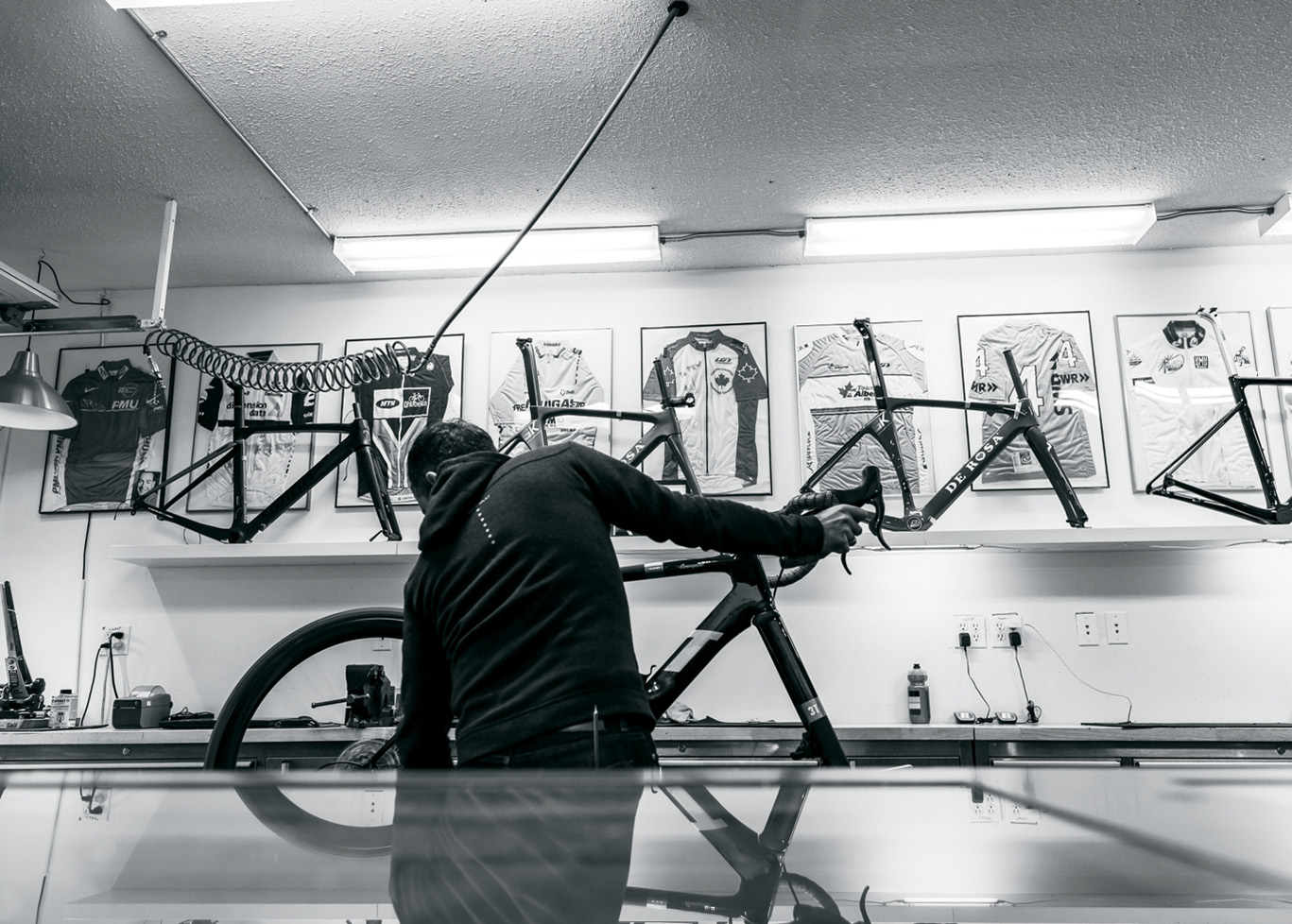 photo: Stirl and Rae Media
photo: Stirl and Rae Media
Pedalhead Road Works
Edmonton
Located in a small space in Edmonton, Pedalhead Road Works isn’t a shop where you just drop in to browse. Visits are by appointment only, but anyone who has been there will tell you it’s well worth it. “I want to focus on each client,” says owner Guri Randhawa. “This way I don’t get interrupted.”
Randhawa initially arrived in Edmonton to pursue an advanced degree in kinesiology and connect it with his keen interest in road cycling. He had plans to get into bike fitting. A professor noted that the degree wasn’t necessary for what Randhawa had in mind. Soon, the idea of Pedalhead Road Works took shape. Influenced heavily by the boutique shops of Europe and tailors making bespoke suits, Randhawa decided that was the business model he wanted to pursue. “My motivation is always to do something differently,” Randhawa says. “Just because something has been done a certain way doesn’t make it right.”
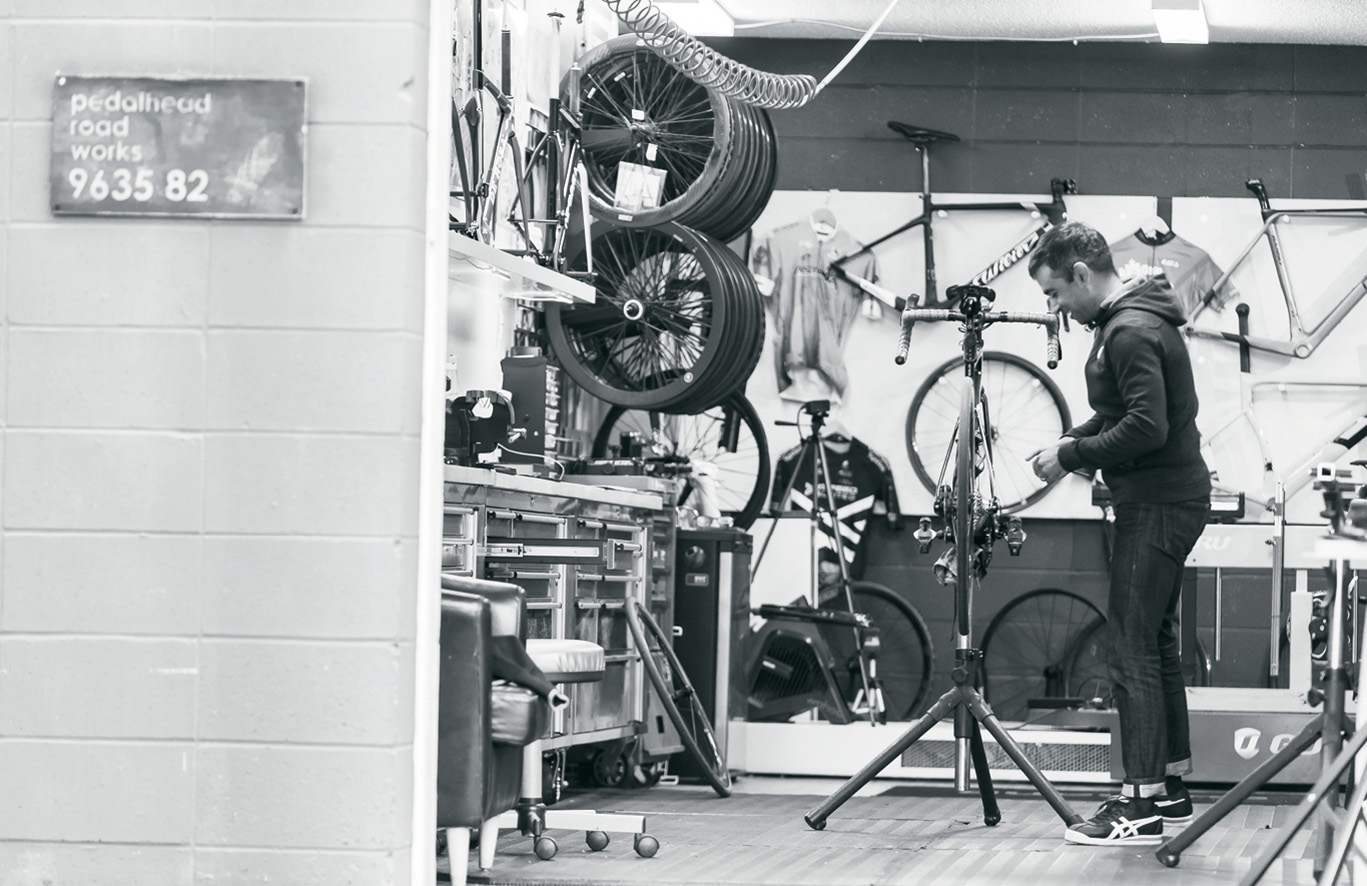 Pedalhead Road Works
Pedalhead Road Works
You can’t buy an “off the rack” bike at Pedalhead. Instead, Randhawa will take time to learn about your riding goals and your taste, and pull together a custom build that is made-to-measure just for you. “I will never compromise to make a sale,” Randhawa says. “I’ll talk someone out of a product if I think it won’t work for them.”
He’ll also pass on projects for which he feels he doesn’t have the expertise. He’s been approached about custom mountain bike builds, but has never done one because his focus has been on road bikes. He has worked on a variety of special projects for some elite cyclists, including Olympic and Paralympic team athletes. But ask him to share a story of a particularly interesting project, and he can’t. “I really just look at each client as an individual and go from there,” Randhawa says. “Everyone gets the same treatment.”
Best For bringing your road bike dreams to life.
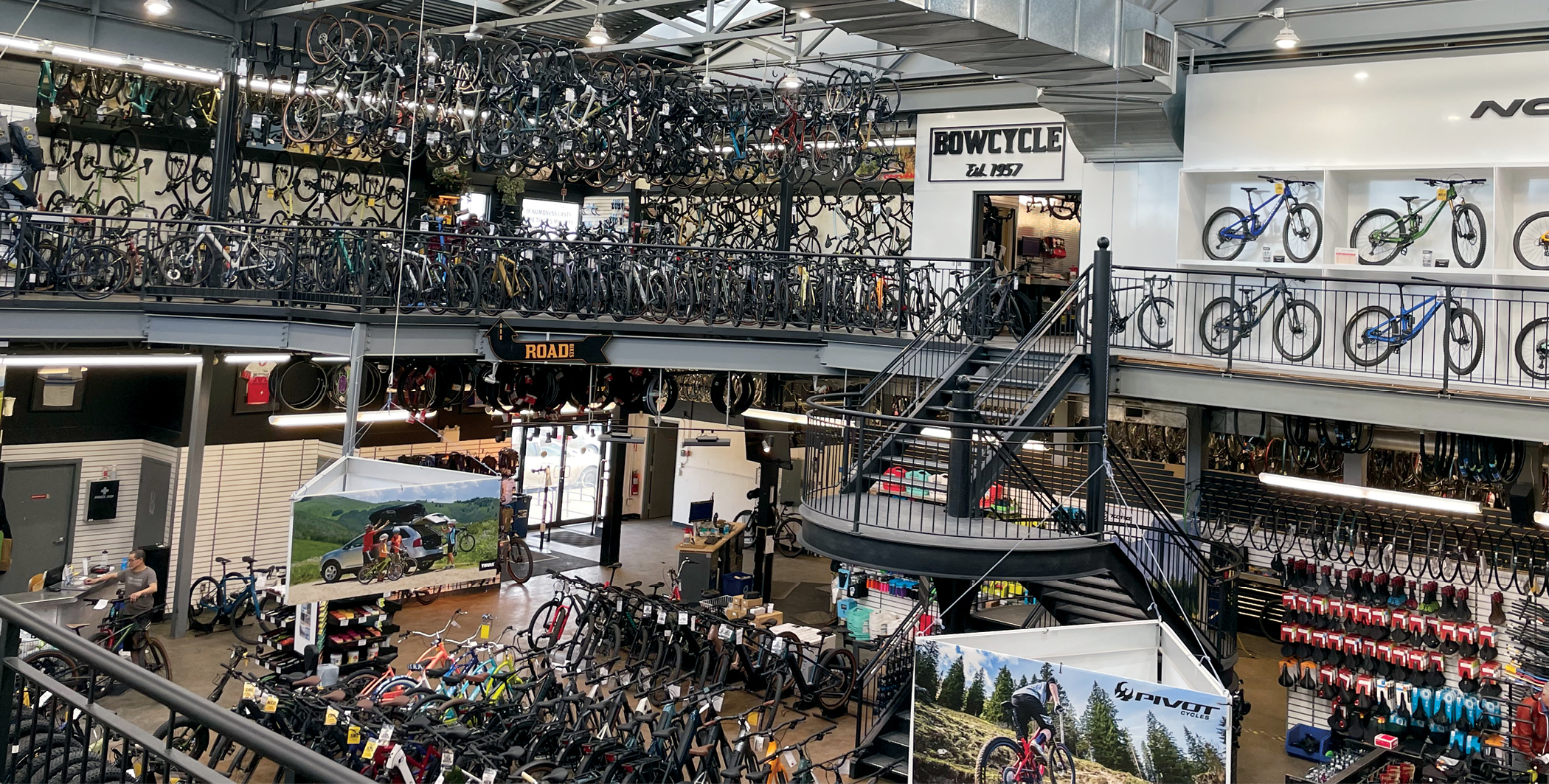
Bow Cycle
Calgary
Bow Cycle started as a family business 67 years ago, selling an array of sports equipment including bikes. By the time the early 1990s rolled around and John Franzky joined the store, the ownership had passed to the second generation.
“The 1990s were an exciting time to be in bikes,” Franzky says. “Mountain bikes were booming and people were heading out exploring new places. The road scene was getting more attention, too.”
By the end of the decade, Bow Cycle had ditched the hockey and fitness equipment to focus exclusively on bikes. In 2006, a new ownership group came together, including Franzky, to lead the shop forward. Bow Cycle is now a huge place—more than 1,500 m2—and has just about everything you could imagine. Unfortunately, that size can draw criticism. Franzky said the store has been called the Walmart of bikes. But he and the other owners try hard to maintain the feeling of a small local shop. “To us that means the owners being out on the sales floor every day,” Franzky says. “We’re all into bikes.”
That enthusiasm has translated into support for many cycling clubs in Calgary, as well as building the Tour de Bowness, a stage race that has evolved to be the biggest in Alberta. The event features a road race, a hill climb and a criterium.
Best For owner engagement. When you see the size of Bow Cycle, you might think the owners would be off somewhere else enjoying life. In fact, they enjoy bikes so much, they’re always out on the sales floor helping customers find their next new bike.
Dunbar Cycles
Vancouver
For followers of Canadian downhill mountain bike racing, Dunbar will already be a familiar name. Not far from some of the most spectacular—and demanding—trails in the world, Dunbar Cycles has deep roots in racing.
In the mid-2000s, Rob Venables was working in construction and riding and racing DH bikes as often as he could. One of the labourers on the construction projects was the son of the owner of Dunbar. His mother wasn’t interested in the bike business and was looking to make a change. Venables and his wife put together a plan and offered to buy the shop. They took over the shop in 2008.
“I didn’t grow up in the industry, so I really looked at everything from a customer perspective,” Venables says. “Selling someone the bike you want might work out in the short-term, but selling them the bike that’s best for them is what works out in the long-term.”
Venables had seen first-hand the lack of support in racing, and so he worked to support racers and build out a team. The race program has expanded substantially, with DH, enduro, and ambassador teams flying the Dunbar flag. The shop also partners with SE Racing to host national-level events.
“What we look for in racers are well-rounded riders who are good ambassadors for the sport, even if they’re not the fastest,” Venables says. “It’s no surprise when you support those riders, they start getting more amazing results.”
Later, Venables began talking with the owners of Corsa Cycles in Squamish. They were looking to sell the business, but wanted to find someone willing to build on their legacy. The two shops had known each other for years through the dealer community, and Corsa’s owners really liked what was happening with Dunbar. In 2017, Venables took over ownership of Corsa as well.
Looking ahead, Venables aims to build more stability into the business after the boom and bust in cycling from the COVID pandemic. He wants that stability for the same reason behind so much of what he does—to support more racing.
Best For downhillers. Before buying the shop, Rob Venables was already hooked on DH riding. It’s no surprise his race team holds so many national titles. Extra bonus, the Corsa Cycles shop has everything you need for your next Squamish trip.
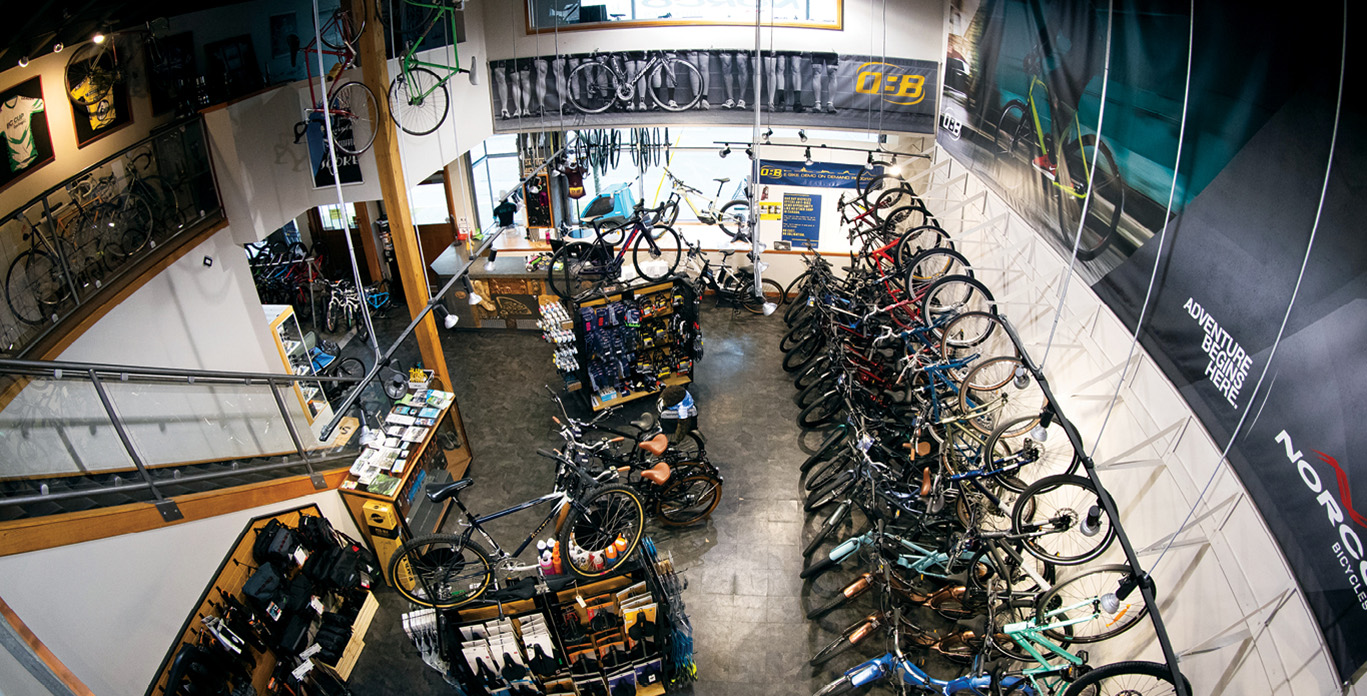 photo: Jay Wallace
photo: Jay Wallace
Oak Bay Bicycles
Victoria
Oak Bay Bicycles is an institution. Celebrating 90 years in 2024, the shop on Vancouver Island has seen the bike industry change over and over again. Oak Bay Bicycles itself continues to adapt to the needs and interests of the customer.
“In the store, we focus hard on hospitality,” says Scott Martin, sales manager and a 20-year employee at Oak Bay. “Everyone gets a hello when they walk in. The staff take the time and care to help the customer find what they need, and everyone is treated as a cyclist, no matter what they ride, from a basic hybrid up to our fanciest bikes.”
That’s been Martin’s take on part of how Oak Bay lives up to its founding mission of “serving you and your bike better.” Oak Bay also focuses a lot on community events of all kinds. “Being a bigger shop means we have that extra capacity to do more,” Martin says.
For International Women’s Day, the shop ran a full program of repair clinics, rider coaching, group rides on road, gravel and mountain bikes, and a parking lot barbecue. Oak Bay is also active in the commuter scene, supporting Go By Bike week in Victoria. It works to influence the development of cycling infrastructure in the city, aiming to ensure there are more—and better—places to ride in Victoria.
The community efforts have made the shop a hub for all kinds of riders, united by a love of bikes. It’s the kind of feeling that transcends the decades and has helped make Oak Bay Bicycles what it is today.
Best For withstanding the test of time. Oak Bay Bicycles has been around longer than most. Thanks to community involvement, experience and strong customer service, it’s still going strong.
A Place we Have to Shout Out
I met Nick Di Cristofaro about 10 years ago, when he was wrenching at a Toronto shop. It wasn’t long after that he started writing for this magazine. His maintenance columns have since helped numerous readers, like you, to get better acquainted with the workings of their bikes. In 2020, he started Forza Performance, an online retailer and repair service. This year, Forza will have a brick-and-mortar shop. I’m excited to pedal on over and have an espresso at Nick’s place and talk bikes with him. —Matthew Pioro
